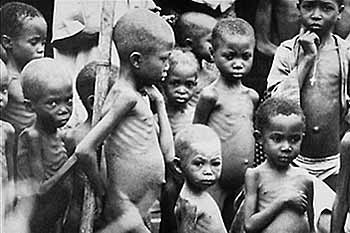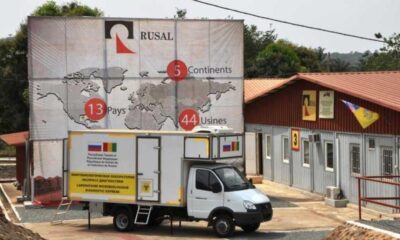Global Issues
The Making of the Third World

After World War 2, what remained of Europe (after the self inflicted consuming flames of WAR and destruction has simmered down) was in serious need of reconstruction. Particularly if Europe wanted to maintain its status as ‘first world’ or ‘most developed’ and wanted to maintain its parasitic power over the rest of the world.
This reconstruction depended on continued access to cheap raw materials as previously provided by colonization. The old colonies were all claiming independence making older colonial systems of exploitation and abuse impossible, which led to a radical shift in the structure of world power.
America was in serious need of more influence over the colonies and particularly wanted access to oil. The US hegemony in the world capitalist system needed markets for excess products, new sites for investment of surplus capital and cheap raw materials to supply the expanding industries and corporations. The US saw this as the perfect opportunity to strengthen its relations with its ‘motherland’ Europe, now in serious financial and social problems.
So, he US invested $19 billion (in 1947 that was a lot of money) into the development of Western Europe via “The Marshall Plan” without any repayment required from them. Only 2 percent ($150 million) of the total investment made went to the ‘Third World’.
The struggle between the USA and the Soviet Union furthermore gave “legitimacy to the enterprise of development and modernization”. The Anti-Fascist sentiment soon gave way to the anti-Communist crusades after the war and the fear of communism became the strongest rationale for ‘development’.
Capital investment was seen as the only answer for ‘development’ to take place.
This capital had to come from the First Worlds through funds provided, for example by the World Bank and the International Monetary Fund.
The international lending organizations thus had to provide the capital and this provided them with the power they seek and were the ones who could name the subjects and control and define the strategies used in development, thus construct the discourse used.
They created “abnormalities” which they would then “treat” and “reform”, alongside assumed superior models of Western “normalities”.
The ‘Third World’ was observed, categorized and analysed with endless specification, always using and designing new techniques of gathering and processing information to refine and increase knowledge “for the good of the subjects”, mapping the economic and social life of all, all under the veil of ‘development’.
The problem was that the result was dictated in advance by the rules as set out from the very beginning, since the language used and the categories structured was deeply embedded in the Euro-centric evolutionistic ideology of modernisation and capitalist development models.
The historical specificities and context of the period between 1945 and 1955 constructed the dominant discursive space for all development that followed and although strategies have changed, the space and discourse confined and shaped it in a linear and limited trajectory of thought that stayed the same. Furthermore, ‘development’ was professionalized in the sense that scientific techniques, strategies and practices were assumed to be producing truthful and objective knowledge and only Western scientists and professionals could produce such knowledge.
This excluded developing countries to a large degree from their own development processes and created a deeper dependency on the West. One therefore first had to conform to the values of the West and be educated by the West before one can understand your own ‘underdeveloped’ state and know how to approach it. As we know today, this has failed to solve the problems of “underdevelopment” at large.
It seems that this project setting out to erase underdevelopment has only been successful in “multiplying it into infinity”.
The truth of the matter is, is that all development for the First World, had to entail the active ‘underdevelopment’ of the Third World…for one to have more another must have less. But what is more important, is that the ones being underdeveloped, must think that they are being assisted and helped in order for the first world to remain in power.
What the developed countries with their “expert” scientific knowledge therefore managed to hide very effectively, is that all their superiority is built on the “suffering and brutalisation of millions” of people actively underdeveloped by the Western capitalist systems of production. Modern development is most strongly linked with an “economy of production and desire” and more importantly with and economy of “closure, difference and violence”. “Violence has been engendered through representation” (Escobar 1995:215).
The Third World became the rejected selves of the First World, representing the negative past from which all wants to progress away.
This is the illusion cast by The First World to construct and implement neo-colonialism…where Africans oppress themselves and their own due to the internalisation of the centuries of lies and abuse, the completion of the education/brainwashing of the Black subject that resulted in the inferiority complex, the acceptance of the dominant discourse of western religion and science that CONvinced the African that he/she is lowest and most primitive on the illusive evolution of human kind.
But the ‘first white world’ is completely dependent on the third world for its survival, ‘the first white world’ is a parasite, and it is a master of illusion,hiding its abuse through fancy words of progress… hiding its murders through rationalisations of inevitable ‘greater good’… and hiding its rape through economic discourse that blames the victim…




















Yahaya Adamu
June 25, 2013 at 12:54 pm
absolutely right.i wish Africans and all ‘developing nations’ (a name tag that was the invention of the parasitic and criminal so called ‘developed’ nations) will wake from our slumbers and devise a means to fight the so called developed nations.if we are really determined we will bring them down on their knees.’emancipate yourselves from mental slavery, none but ourselves can free our mind.have no fear for atomic (or nuclear energy)…… ‘ late bob marley.they are dependent on us.the asian tigers are free today name them, china, japan, north korea etc and iran is almost free.we can also free ourselves from the shacles of neo-colonialism.
Chris Adukwu
June 25, 2013 at 7:01 pm
Where is Africa in these? Just followers, Follow follow like Fela will say.